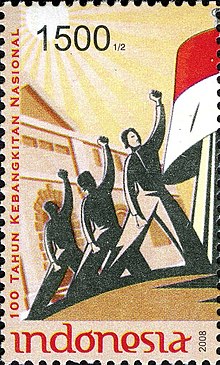
Back الصحوة الوطنية الإندونيسية Arabic Rahina Kebangkitan Nasional BAN Kebangkitan Nasional Indonesia ID Risveglio nazionale indonesiano Italian Kebangkitan Nasional Indonesia Malay Indonesische nationale beweging Dutch Indonezyjskie Przebudzenie Narodowe Polish 印度尼西亞民族覺醒 Chinese Ìn-nî Bîn-cho̍k Kak-chhéⁿ ZH-MIN-NAN
| History of Indonesia |
|---|
 |
| Timeline |
|
|
The Indonesian National Awakening (Indonesian: Kebangkitan Nasional Indonesia) is a term for the period in the first half of the 20th century, during which people from many parts of the archipelago of Indonesia first began to develop a national consciousness as "Indonesians".[1]
In the pursuit of profits and administrative control, the Dutch imposed an authority of the Dutch East Indies on an array of peoples who had not previously shared a unified political identity. By the start of the 20th century, the Dutch had formed the territorial boundaries of a colonial state that became the precursor to modern Indonesia.
In the first half of the 20th century, new organisations and leadership developed. Under its Ethical Policy, the Netherlands helped create an educated Indonesian elite. These profound changes amongst the indigenous Indonesian population are often referred to as the "Indonesian National Revival". They were accompanied by increased political activism and culminated in Indonesian nationalists' proclaiming independence on 17 August 1945.[1]
- ^ a b Ricklefs (1991), pp. 163–164.
© MMXXIII Rich X Search. We shall prevail. All rights reserved. Rich X Search